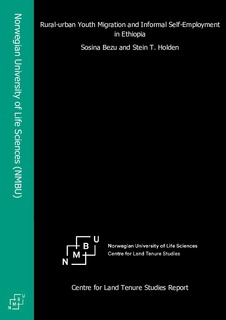Rural-urban Youth Migration and Informal Self-Employment in Ethiopia
Research report
Permanent lenke
http://hdl.handle.net/11250/2475136Utgivelsesdato
2014-11-01Metadata
Vis full innførselSamlinger
- Publications [1488]
Originalversjon
Ås: Norwegian University of Life Sciences, Center for Land Tenure no. 01/2014Sammendrag
Empirical studies in the migration literature indicate that migration is often welfare improving for the migrant. But it is also possible that youth migrants become more susceptible and less competitive in urban areas because of lower endowment in education, experience, financial capital and social network. This report examines the experience of youth migrants, their challenges and opportunities using three sets of data that enable a mapping of youth migration from rural villages to the urban centers in Ethiopia. The data we used in this study include; 1) household level data from southern Ethiopia, collected from surveys in 2007 and 2013 (about 600 households); 2) data from a survey of tracked youth who have migrated from southern Ethiopia in the period 2007-2013 (75 youth); and 3) data from a survey of youth who are engaged in informal self-employment in two urban centers - Addis Ababa and Hawassa (445 youth). We used both qualitative and quantitative analysis, including econometric methods. The report found significant rural-urban migration in Ethiopia. One-third of the households in the village experienced rural-urban migration in the period 2007-2013; and 21% have at least one youth migrant. Youth migrate for various reasons, but the predominant factor is better livelihood. Most youth migrate with the consent of their parents, who in most cases cover the costs of their migration. The majority of migrants left their village with reasonable expectation about life in urban areas and they are now generally satisfied with their life. Migrant youth face several constraints in urban areas. Tenure insecurity, in terms of rental arrangements in residential units as well as work place insecurity from eviction and confiscation, seems to be very important problems. The majority of the youth migrants are also vulnerable and food insecure since they do not have the social network that can provide them with informal safety net during crisis. Young women see
